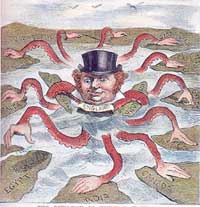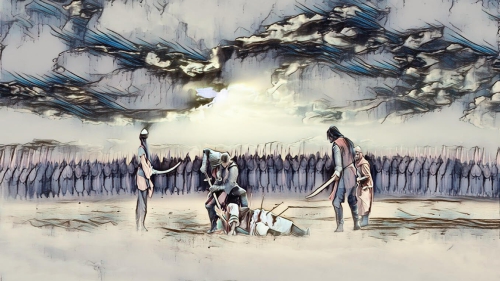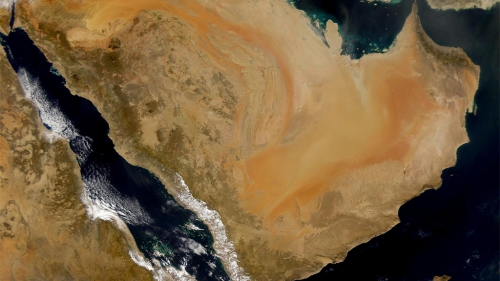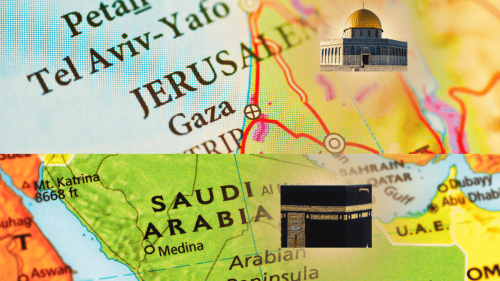A Eurocentric Problem
 |
He who knows himself and others
Here will also see,
That the East and West, like brothers,
Parted ne'er shall be.
Goethe [1]
In no other major civilization do self-regard, self-congratulation and denigration of the 'Other' run as deep, nor have these tendencies infected as many aspects of their thinking, laws, and policy, as they have in Western Europe and its overseas extensions.[2] These tendencies reached their apogee during the nineteenth century, retreated briefly after World War II, but have been staging a come back since the end of the Cold War.
For several decades now, critics have studied these Western tendencies under the rubric of Eurocentrism, a complex of ideas, attitudes, and policies, which treat Europe - when it is convenient - as a geographical, racial and cultural unity, but places Western Europe and its overseas extensions at the center of world history since 1000 CE.[3]
Unlike the garden variety of ethnocentrism, Eurocentrism emerged as an ideological project - shaped by Europe's intellectual elites - in the service of Europe's growing expansionist drive, starting in the sixteenth century. It makes sweeping claims of European superiority in all spheres of civilization. In this worldview, only Europeans have created history over the past three thousand years, beginning with the ancient Greeks. In various accounts, this centrality is ascribed to race, culture, religion and geography.
The central organizing principle of Eurocentrism is the division of the world into unequal moieties: us and them, self and the other. All those qualities that Western thinkers believe are emblems or sources of superiority are securely placed in the 'us' category; and their opposites are pinned on 'them.' The arrogance of this dichotomy is breathtaking.
Once these dichotomies are in place, it becomes quite easy to 'explain' Europe's putative centrality in history. One set of superior characteristics - innate, unchanging, unique - account for the Western lead in all avenues of human endeavor, whether economic, technological, military, scientific or cultural. It is a tautological narrative of history par excellence.
In order to 'explain' the history of European superiority, the Eurocentrics first had to manufacture the history of this superiority. They endowed 'Europe' with historical depth by appropriating Greece and Rome; this was accomplished by defining Europe as a geographical, racial and cultural unity. In addition, they denied the eastern origins of Greek civilization, and, for the same reason, they passed over the connections of early Christianity to Syria and North Africa. In order to obscure Western Europe's extensive debt to the Islamicate, they devalued the birth of new cultural formations in western Europe in the eleventh and twelfth centuries, flowing from contacts with the Arabs in Spain, Sicily and the Levant.[4] Instead, this history was moved forward several centuries to place it in northern Italy, whose cultural flowering - defined as a rebirth - was connected to the 'direct' recovery of Greek philosophy, sciences and literature.
The Eurocentrics construct a European history that begins in Greece, migrates westward to Rome, and again to points in Western Europe. In tracing the origins of the Renaissance to Greece, the Eurocentrics show little embarrassment about the fifteen centuries during which the Greek sciences and philosophy - mostly forgotten in 'Europe' - were being cultivated in the Middle East.
While they were fabricating a history of the rise of the West, the Eurocentrics were also engaged in denying that the rest of the world had any history. Yes, civilization began in the East but, after these early beginnings, the Asiatics have been immovably stuck in the past, forcing history to move westward in order to make progress. Europe's most radical thinker of the nineteenth century, Karl Marx, too bought into this myth about static Asiatic societies whose despotism deprived them of the engine of 'dialectical' change.
Over the last few decades, this Eurocentric history has increasingly come under challenge from the 'peoples without history,' dissenting scholars in the West, and, most importantly, from new facts on the ground - the rise of national liberation movements, the dismantling of Western colonial empires, the socialist revolutions in China and Vietnam, the Iranian revolution, and, increasingly, the rise of several leading centers of economic dynamism in east and south Asia. Despite this challenge, Eurocentrism still controls the commanding heights in the think tanks, media, political discourse and popular prejudices of nearly all Western societies. The weight and momentum of Eurocentric tendencies, powered by the best Western minds over centuries, cannot be overthrown within a few decades.
Cartographic Violence
Eurocentric distortions have not spared cartography, the 'science' of map-making.
Europe is relatively small in relation to the great landmasses to the east and south, Asia and Africa. The Eurocentrics might have chosen to argue that Europe has maintained its centrality despite its smaller size, proof of its qualitative lead over the much larger landmasses of Asia and Africa. They chose otherwise. They could not pass up the opportunities that maps presented for appropriating the symbols of superiority in the realm of cartography.
The powerful belong at the top. Eurocentrism demanded that cartography place Europe at the top of the world. This was easily accomplished by orienting the globe so that the North appeared at the top of the globe, or, in the case of maps, at the top of the page. It is always a source of some confusion for my students when I hang the map of the world upside down so that the North goes at the bottom. It is a bit unsettling to learn that there is no logic - nothing natural - about the North-at-the-top globes and maps.
World maps were not everywhere drawn with the North-at-the top orientation. The Muslims in their heyday - when their empires stretched from Spain to Khurasan and India - were making world maps, which placed the South at the top, even though this placed Africa above the central Islimicate lands stretching from the Nile to the Oxus. In their case, perhaps, orientation of the maps did not matter as much, since they always came out at the center.
In addition, Europeans gave currency to world maps that used Mercator's cylindrical projection. Was this choice accidental? Admittedly, the Mercator map was useful for mariners, since a line connecting two points on this map showed the true direction. But are we to believe that sea captains had an interest in - and the power as well - to impose maps useful to them on the rest of society? More credibly, the Mercator maps were chosen because they greatly exaggerated the size of Europe, making it as large as, or larger than, Africa.
Incredibly, some Mercator maps published in the United States engage in cartographic violence. In order to center the United States on their maps, the publishers are quite happy to tear Asia right down the middle, pushing its two halves to the left and right edges of the map. It matters little that this sundering of Asia greatly diminishes the cartographic value of this truncated map of the world. This quite nicely illustrates the first casualty of Eurocentrism - its disregard for reality, and its willingness to engage in epistemological violence in order to place Europe at the center of the world.
Inverting the Paradigm
Growing up, I knew that ignorance was the chief support behind prejudice. Prejudices, whether religious or ethnic, diminished with education and scholarship. And that is how it should be, I thought. Prejudice is sustained by ignorance. Superior intellects, combined with wide learning, should have little difficulty in clearing the web of lies spun by the powerful. At the time, I little comprehended that superior intellects could also be bought and seduced by temptations of power, money and various forms of tribalism, especially if their culture had not prepared them to resist these blandishments.
It took a few years of familiarity with the Western world to overcome my navet about the relationship between tolerance and intellect. My encounters with Western classics and the Western media slowly confirmed me in my worry that groupthink in Western societies ran deeper than in Islamicate societies.
My growing familiarity with the writings of Western Orientalists and, later, the greatest European thinkers of the West - Montesquieu, Kant, Hegel, the Mills, Marx, Weber - inverted the paradigm I had acquired in youth. The prejudices of Western societies had their source at the top - in the best Western intellects - not in popular prejudice. They were supported by reasoning, by learned historical narratives, by monumental efforts at myth-making. Indeed, the leading thinkers fed and supported the prejudice of the populace.
I can still recall my disappointment when I bought Will and Ariel Durant's compendious eleven-volume set, The Story of Civilization, to discover that they had devoted only one of their eleven volumes to non-European civilizations. Tellingly, this volume carried the title, Our Oriental Heritage. In the Durants' Story, the Orientals make a brief early appearance on the stage of history, in the infancy of human civilization, but having launched the West on its brilliant civilizational trajectory, they graciously make an exit from the stage of world history. This was not an oddity, I later learned. It was nearly the norm, even with modern writers.
Another book I read a few years later, Kenneth Clark's Civilization, nothwithstanding its title, is exclusively about the art, architecture, philosophy and sciences in Western Europe. Clark succeeds in talking about such things without scarcely a mention of how they might be connected to India, China, the Islamicate, Africa and the Americas.
Despite my familiarity with Eurocentric biases in Western thought, I still cannot suppress my disappointment at new instances of racism in Western Europe's best and brightest thinkers. Immanuel Kant divides humans into four 'races,' set apart from each other by differences in "natural disposition." "The negroes of Africa," he writes, "have by nature no feeling above the trifling." In support, he recalls David Hume's challenge to show him a single 'Negro' with talents. On hearing of a 'Negro' carpenter who berated whites for complaining when their wives abused their liberties, Immanuel Kant remarked that there might be some truth in that observation. Then, spitefully, he added, "...in short, this fellow was quite black from head to foot, a clear proof that what he said was stupid." To Kant the hierarchy of races is clear. "Humanity," he asserts," is at its greatest perfection in the race of the whites. The yellow Indians are far below them and at the lowest point are a part of the American peoples."[5]
Few of Europe's most eminent thinkers, especially during the eighteenth and nineteenth centuries, could escape the siren songs of Eurocentrism. Some Western thinkers even today cannot confront this ugliness. French philosopher and psychoanalyst, Octave Mannoni, " boldly claims, "European civilization and its best representatives are not...responsible for colonial racialism; that is the work of petty officials, small traders, and colonials who have toiled much without great success."[6] Spare the elites: blame the lumperproletariat!
A leading light of nineteenth century Britain, James Mill, philosopher and historian, wrote a massive five-volume history of India, it appears, with the sole object of demonstrating how deficient the Indians are in governance, the sciences, philosophy, technology and the arts. In short, the Indians were barbaric and quite incapable of managing their own affairs except under enlightened British tutelage. His son, John Stuart Mill, remarked, "The greater part of the world has, properly speaking, no history, because the despotism of custom is complete. This is the case over the whole East (emphasis added)."[7]
How different was the approach of another scientist and historian, Al-Biruni, an Afghan from the eleventh century, who - unlike James Mill - traveled through India for thirteen years, learned Sanskrit, translated Sanskrit works on mathematics, studied Indian society first hand, and invited Indian scholars to Ghazni, in preparation for his two-volume treatise on Indian civilization. His stated intention in his researches on India was to provide his Muslim audience with authentic accounts of its geography, religions, sciences, culture, arts and manners - and, thereby, elevate the quality of their discourse about the Indian peoples. He concluded his treatise with these remarks: "We think now that what we have related in this book will be sufficient for anyone who wants to converse with the Hindus, and to discuss with them questions of religion, science, or literature, on the very basis of their own civilization (emphasis added)."[8]
Modernity: How Western?
In the eighteenth century, when a small number of European thinkers were vigorously making the case for the supremacy of reason in human affairs, they knew - and were often happy to acknowledge - that they were following in the footsteps of Confucius who had preceded them by two millennia.
By the end of the century, however, a stronger and more confident Europe had forgotten its debt to the Chinese or any source outside of Europe. Insistently, they began to claim that reason, science and democracy were exclusive to European. It was a strange claim from thinkers who claimed that knowledge should be based on observation and reason - it should be objective.
In truth, it is hard to imagine how any society, including the most primitive, could have adapted to their ecology without following - at least intuitively - the scientific method. In practical matters, knowledge unsupported by experience would have proved fatal for societies that were exposed more frequently than ours to life-threatening conditions. Moreover, the Arab scientists were not only practicing the scientific method in their studies on optics, chemistry and astronomy, but in the early eleventh century, Ibn al-Haytham, known to the West as Alhazen, had offered a clear theoretical formulation of the scientific method. Roger Bacon, the putative founder of the scientific method had read parts of al-Haytham's major work, Kitab al-Manazir, in a Latin translation, and summarized it in his own book, Perspectiva.
If democracy is equated with the counting of heads, even the United States - the self-declared bastion of democracy - was counting considerably fewer than half the heads until 1920, when women gained the right to vote. Blacks would not be counted until 1965. On the whole, the counting of heads has come to Europe after centuries of economic progress; it was not the foundation of their progress. Monarchic absolutism was stronger in nearly all of early modern Europe than it was in the Islamicate, whose rulers had only limited control over legislation and, in addition, faced institutionalized opposition from the class of legal scholars.[9] The nomadic tribes in Africa and Asia had their council of elders, were led by a meritocracy, and, while their egalitarianism often excluded women, it generally went farther than in the stratified societies of Europe. The Indians had local self-government in their panchayats. The Pashtoons had their parliament in the loya jirga. The early Arabs could withhold baya - an oath of loyalty - from an unacceptable new ruler.
If democracy is defined by its substance, by tolerance - respect for differences of religion, color, ethnicity and phsyiognomy - most Enlightenment thinkers limited its application only to members of the white race. Tolerance has not been a particularly visible European virtue. In modern times, but especially since the Age of Enligtenment, Christian intolerance was replaced by a racial intolerance that translated quickly into schemes of genocide or support for slavery in the Americas, Africa and Oceania.
The Ottomans, with their system of millets - which granted a great deal of autonomy to their non-Muslim religious communities - afforded far greater protections to all segments of their subjects. In imposing one set of laws pertaining to the affairs of the family - often of Christian inspiration - modern Western states cannot equal the tolerance of the Islamicate which allowed its non-Muslim communities to order their family affairs according to their own religious laws. Universally condemned by Western writers, the tax imposed by Muslim states on its non-Muslim population was often considered a privilege by the latter since it exempted them from military service. When Western powers forced the Ottomans to grant 'equality' to its Christian population, they rioted against this measure in several Ottoman cities.
The rejection of priestly intermediation, starting in the fifteenth century, is commonly regarded as the first blow for modernity: allegedly, it freed the European to read the Bible in the vernacular and deal directly with his God. Islam had accomplished this, in a more radical fashion, in the early seventh century; and who is to say that Europeans were unaware of this Islamic precedent, or that there was no Islamic inspiration behind the Protestant movement.[10] Oddly, however, the rupture with Rome also freed Christianity to be nationalized, to be appropriated by the newly emerging states in Western Europe, who proceeded to establish a national church and doctrine, which then sanctioned religious wars, persecution and, no less, colonization and slavery of non-Europeans. In other words, the freedom of conscience in the early modern West was generally more circumscribed than in the Islamicate, where no Church existed to enforced religious dogma, and Muslims were free to live their lives according to the legal traditions of their choice.
The inspiration for the central idea of orthodox economics - its vigorous opposition to state interventions - came primarily from the Chinese. In his time, Francois Quesnay, the leading light of the French pioneers of this policy - the Physiocrates - was known as the 'European Confucius.' The watch-word that summed up Physiocratic political economy, laissez faire, was a direct translation from the Chinese phrase wu wei. [11] Adam Smith, the putative Anglo-Saxon founder of classical economics, was a disciple of Quesnay. Few orthodox economists know that the language they speak - though not its intent - was invented by the ancient Chinese.
Since machines defined modernity - for a growing numbers of Europeans starting in the eighteenth century - it may be worth recalling that many of the machines that led the Europeans into modernity - water mills, windmills, the compass, lateen sail, astrolabe, the armillary sphere, the inner mechanisms of the clock, seed drills, mechanized mowers and threshers, iron moldboard plow, printing press, pumps, the rudder, cannons and guns, and many others - had their origins outside Western Europe, in China or the Islamicate. [12] If they originated in Greece, they were refined and improved for many centuries in the Islamicate before they were passed on to western Europe.
One of the arch proponents of Western imperialism, Rudyard Kipling, entrenched in his deeply parochial thinking, could not imagine that the East and West would ever meet. Pity, the news had not reached him that they had been meeting - with the West receiving most of the benefits of these encounters - since ancient times.
1. Edgar A. Bowring, Poems of Goethe (John W. Parker & Son, 1853): 272
2. E. C. Eze, Race and the Enlightenment: A Reader (Blackwell, 1997); M. Shahid Alam, "Articulating Group Differences: A Variety of Autocentrisms,"" Science and Society (Summer 2003): 206-18.
3. For a review of this literature, see Andre Gunder Frank, "East and West," in: Arno Tausch and Peter Herrmann, eds., The West, Europe and the Muslim World ( Novinka, 2006).
4. As a noun, 'Islamicate' seeks to avoid the confusion that arises from using 'Islam' when speaking of the world of Muslims, as in Europe and Islam. As an adjective, Islamicate replaces Islamic; the former refers to activities or actions connected to Muslims, differentiating this from the latter which should be used only when referring to activities which flow from the normative principles of Islam.
5. Eze, Race and Enlightenment: 47, 55, 63.
6. Octave Mannoni, Prospero and Caliban: Psychology of Colonization (University of Michigan Press, 1990): 24.
7. John Stuart Mill, Liberty (NuVision, 1859): 60.
8. Alberuni, Alberuni's India, translated by Edward C. Sachau, and abridge and edited by Ainslie T. Embree (The Norton Library, 1971): 246.
9. Noah Feldman, The Fall and Rise of the Islamic State (Princeton University Press, 2008): 27-35.
10. Charles Lindholm, The Islamic Middle East: An Historical Anthropology (Blackwell, 1996):13.
11. Hobson, The Eastern Origins: 195-6.
12. Hobson, The Eastern Origins: ch. 9
M. Shahid Alam is professor of economics at Northeastern University. He is author of Israeli Exceptionalism: The Destabilizing Logic of Zionism (Palgrave Macmillan, 2009). You can reach him at alqalam02760 [at] yahoo [dot] com





























